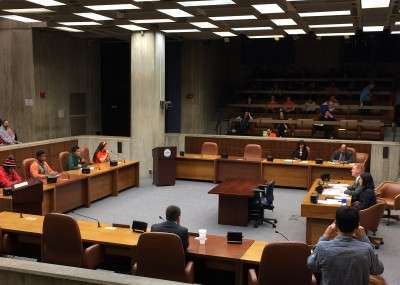
The Boston City Council voted Wednesday to increase its term limits from two to four years, according to a same-day report from the Committee on Government Operations and Special Committee on Charter Reform.
The councilors voted to increase their term limits in order to reduce the amount of money the city spends on biannual citywide council elections, according to the report.
“Having a municipal election every two years where oftentimes voter turnout is low is burdensome on city resources,” the report stated. “Making the term of office for city councillors a four-year term will reduce costs in having multiple elections and will allow the city to operate in a more effective and efficient manner.”
The report mentioned that the bill will not immediately go into effect following the City Council’s vote.
The cost of conducting a citywide election is currently $800,000, while voter turnout for these elections has decreased from 40 percent in 2013 to 12 to 15 percent in 2015, the report stated.
“[Increasing terms] could lower costs of elections, reduce the constant need to fundraise and, most importantly, it would give elected officials on the council more confidence to try ideas that challenge the status quo by having a little bit of security,” said City Councilor Timothy McCarthy, who voted in favor of the bill.
McCarthy also discussed how the two-year terms force elected officials to constantly campaign and fundraise.
“I know that some people will argue that four-year terms tend to get you entrenched, but I would actually argue just the opposite,” McCarthy said. “When you are out campaigning for an entire year and you win and you only have a year off, people always say, ‘You’re kidding me, Tim, you just won.’”
McCarthy also mentioned how increasing term limits would benefit the councilors and their potential opponents in future elections.
“I would argue that it’s more difficult for people to gear up and run against you in a two-year span than it would be in a four-year span,” McCarthy said. “The logic there being … they have four years to get a war chest together or to attend the meetings you’re attending or to start their campaign against you.”
Pam Wilmot, executive director of Common Cause Massachusetts, expressed support in a Thursday statement for City Council President Michelle Wu, the only councilor to oppose the bill. Wilmot said that for her, the bill goes against democratic values.
“It simply makes no sense for a Boston City Councilor to hold office for four years while state legislators and Members of Congress are elected for two,” Wilmot said in the statement. “For offices that are supposed to represent the people, regular elections at short intervals ensure that politicians talk to voters consistently and can be held accountable to them.”
Wilmot said there are alternative options to help increase voter turnout and lower election costs.
“Low voter turnout in council elections is a problem, but there are more direct ways to solve that issue, such as shifting city elections to even years to be held concurrently with state elections,” Wilmot said in the statement.
Several Boston residents said the City Council’s decision seemed unreliable, while others said they understood the motives behind the decision.
Adam Barsoum, 36, of Jamaica Plain, said he finds it difficult to trust the City Council.
“If there’s evidence that they’re just trying to extend their time to make money, I’ve never seen any good reason to trust them,” he said. “I haven’t seen them do any of the things they always talk about doing.”
In light of the councilors’ vote to raise their own salaries, Ryan Marvin, 22, of the North End, said he believes the City Council only makes decisions for its benefit. In November, the City Council voted 9-4 to raise the salary of its members, The Daily Free Press reported on Nov. 3, 2015.
“I’m disappointed that City Council would increase the amount of money they’ll make instead of [putting] money into the community,” he said. “I don’t have a problem with them voting to extend their terms, I just have a problem with it when they also voted to raise their own pay.”
Barry Walker, 38, of Back Bay, said he understands why the City Council wants to move toward four-year terms.
“These days, every campaign process seems to start earlier and be more involved,” he said. “A two-year term is short, and you’re going to constantly be in a campaign cycle and it may be more difficult to govern and make decisions outside of your desire to be reelected.”


















































































































